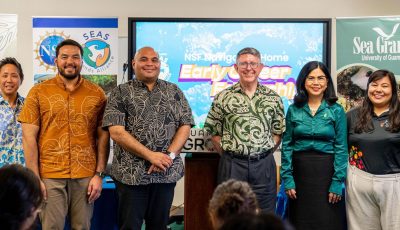UOG workshop will examine potential for regional aquaculture investment
Local entrepreneurs, farmers, and other interested parties invited to participate!
Aquaculture is gaining popularity across the world as a sustainable way to produce fish and other aquatic species. As wild fishery populations dwindle, this technology has the potential to facilitate economic expansion and establish effective, environmentally conscious means of producing food locally with consistent yields. While the Western Pacific Islands are fortunate to have ideal conditions for aquaculture, there are only a handful of farms in the region; an upcoming meeting at the University of Guam hopes to change this.
On Monday, Oct. 8, from 1pm to 5pm, the Center for Tropical and Subtropical Aquaculture, together with the University of Guam and the College of Micronesia, will host a workshop to solicit inputs on aquaculture opportunities in Guam and the Western Pacific region. We would like to invite local farmers, entrepreneurs, or other interested parties to attend this free half-day event to share their visions for a robust local aquaculture industry.
The workshop is part of a three-day meeting “Partnership for Success: Strategic Planning for Aquaculture Development in the Western Pacific Islands,” and will be led by CTSA executive director Dr. Cheng-Sheng Lee, UOG College of Agriculture dean Dr. Lee Yudin, and College of Micronesia dean Dr. Singeru Singeo.
The purpose of the workshop is to bring together researchers, government officers, and other industry stakeholders to identify opportunities for aquaculture development in the region, with an overall goal of generating revenue for local economies. At a subsequent closed meeting, researchers will develop an action plan to enhance collaborative efforts in the region to overcome roadblocks for sustainable aquaculture.
Aquaculture is the farming of aquatic organisms such as fish, shellfish, and even plants. When compared with the worldwide aquaculture industry, the Pacific Region sector is slow growing. In many other regions of the world, aquaculture has been incorporated substantially into food production schemes as policy makers recognize the need for a sustainable source of protein to meet the demands of growing populations and declining wild stocks of fish.
CTSA is funded by the USDA’s National Institute of Food and Agriculture. The center’s mission is to support aquaculture research, development, demonstration, and extension education to enhance viable and profitable U.S. aquaculture. For more information, visit www.ctsa.org or contact Meredith Brooks mbrooks@ctsa.org. (UOG)



























